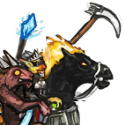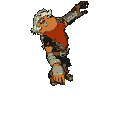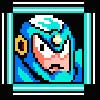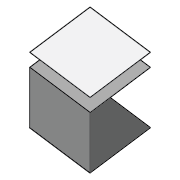|
Last update I'll post for a while, because I'm going to start working on behind the scenes stuff like occlusion culling. My level generator is now procedural rather than random, so it produces continuously pathable levels. http://www.youtube.com/watch?v=yiU47B-oR48 The generator is split into several parts. The first stage is to produce a 2D tile map using a tunneling algorithm. The map generated in this stage looks like something out of a very basic roguelike - every cell is either floor, wall, or obstacle. In the future I'll add more tiles, like 'pit', 'water', etc. Next that 2D map gets converted to a a 3D voxel map by following some basic rules. For example, floor tiles are empty from y-layers 1-3, walls are completely solid across all layers, and obstacles are solid on layer 1 and have a chance of extending vertically into layer 2. From there the mesh generation algorithm is run on the voxel map. Each stage of the generator is completely independent. So I could have multiple map generators and multiple rules for transforming tilemaps into voxel maps, and mix them up for a lot of variety in possible level designs.
|
|
|
|

|
| # ? May 9, 2024 03:59 |
|
That's pretty loving cool man. Are you intending to turn this into a game or is it more of a tech demo thing that you're making?
|
|
|
|
Gerblyn posted:That's pretty loving cool man. Are you intending to turn this into a game or is it more of a tech demo thing that you're making? I'd love to turn it into a game (my loose concept is a mashup between DOOM and rogue. Think old-school, Serious Sam-style shooting but with permadeath and an inventory.) But mostly it's a portfolio piece, trying to get a job in the industry.
|
|
|
|
Gerblyn posted:I'm actually writing a TBS game at the moment and the approach I've chosen for this is to have a Unit controlled by little command data structures, which instruct it to do things like "Move to X" or "Attack Y". So, instead of calling a function like: The combination of commands and response lists are really good. The last thing you can do is combine all of them into a sort of 'event' system. Where the game listens to a set of conditions, and fires off triggers based on it. Wrapped into XML you can do fancy things like: code:I built a really nice engine like this, it was used to produce 3 games and a multiplayer version: http://www.kongregate.com/games/urbansquall/battalion-vengeance iopred fucked around with this message at 00:57 on Apr 9, 2011 |
|
|
|
Paniolo posted:I'd love to turn it into a game (my loose concept is a mashup between DOOM and rogue. Think old-school, Serious Sam-style shooting but with permadeath and an inventory.) But mostly it's a portfolio piece, trying to get a job in the industry. drat thats a good idea. Like I could have done that a while ago but didn't because I thought I needed a whole game package. But I guess I could just concentrate on tech demos. I'm still wishin I was as far as you into development for that stuff though
|
|
|
|
Paniolo posted:Last update I'll post for a while, because I'm going to start working on behind the scenes stuff like occlusion culling. My level generator is now procedural rather than random, so it produces continuously pathable levels. Love the stuff you've been posting, procedural things are always real cool. I'm starting to get into shaders more after writing out my phong shader (which is a milestone for me because I actually understand the math). I'm wondering though how would multiple lights be handled? I'm using OpenGL so would I define the lights using glLightfv and iterate through them inside the shader? Or would I be doing something completely different?
|
|
|
|
ShinAli posted:Love the stuff you've been posting, procedural things are always real cool. glLight* functions won't work with shaders, they're for the fixed-function pipeline. Pass the relevant lighting info into the shaders via constants. Within the fragment shader iterate over all the lights (you can set the number of lights via a shader constant) and apply their contribution to the pixel.
|
|
|
|
Paniolo posted:glLight* functions won't work with shaders, they're for the fixed-function pipeline. Pass the relevant lighting info into the shaders via constants. Within the fragment shader iterate over all the lights (you can set the number of lights via a shader constant) and apply their contribution to the pixel.
|
|
|
|
So basically make the loop rely on constants and check at every iteration if the light exists? Is there a reason why the GPU would be terrible with loops of unknown lengths? Blah blah physics EDIT: I'm retarded, I had another call to my function that initializes physics stuff after I've added my terrain shape, making a new dynamics world. ShinAli fucked around with this message at 03:00 on Apr 11, 2011 |
|
|
|
I am working on my thesis which partially involves developing a game that I need to run on pretty much all platforms simultaneously (OSX, Windows, Linux, Android, iPhone, etc). Yes, I know that these all use vastly different languages and resources, but I have heard of development software that makes it easy to port... I am looking for something easy to develop with, either in 2d or 3d, that wouldn't be too much of a hassle to port. I am somewhat versed in C++ and Java, but would be willing to learn some other language to make this happen quicker. What would you recommend?
|
|
|
|
Erotic Crab posted:What would you recommend? Unless you're worried about getting scooped, can you tell us what you're researching? I spent a summer working on a multimedia research project with similar constraints, and the only reasonable solution we found was to make a browser-based game. It turned out alright, but I don't think I'd work on anything like it again.
|
|
|
|
Erotic Crab posted:I am working on my thesis which partially involves developing a game that I need to run on pretty much all platforms simultaneously (OSX, Windows, Linux, Android, iPhone, etc). Yes, I know that these all use vastly different languages and resources, but I have heard of development software that makes it easy to port... I think Unity can hit all of those except for Linux. SDL could probably target all of them but you'll have to write platform-specific code for stuff it doesn't do. Plus I don't know if you can use OpenGL with SDL on all of the platforms it supports, but the 2D functionality should work. HTML5 might be your best bet.
|
|
|
|
PDP-1 posted:If you compile all your scripts at build time you have to re-build the whole project every time you make a modification to any one script. Makes sense, if it's feasible I'll probably end up doing this, then. Thanks! Gerblyn posted:I'm actually writing a TBS game at the moment and the approach I've chosen for this is to have a Unit controlled by little command data structures, which instruct it to do things like "Move to X" or "Attack Y". This is also a good idea, rather than having each unit follow a script, though I don't know how gung-ho I'll go about it (I think I'd still rather them handle their own UI stuff, but we'll see). Thanks to you too!
|
|
|
|
Erotic Crab posted:I am working on my thesis which partially involves developing a game that I need to run on pretty much all platforms simultaneously (OSX, Windows, Linux, Android, iPhone, etc). Yes, I know that these all use vastly different languages and resources, but I have heard of development software that makes it easy to port... http://code.google.com/p/angel-engine/ This is designed for exactly what you have in mind, and I've personally seen the demos seamlessly run on iOS as well. Barring this, Unity is probably your best bet.
|
|
|
|
Paniolo posted:I think Unity can hit all of those except for Linux. SDL could probably target all of them but you'll have to write platform-specific code for stuff it doesn't do. Plus I don't know if you can use OpenGL with SDL on all of the platforms it supports, but the 2D functionality should work. For the sake of a complete answer, I have had good luck running Unity projects under Wine. You should be able to make your Windows build then package it up with a wine wrapper with minimal effort. According to the AppDB the example project played just fine.
|
|
|
|
Well it'll cost $800 to get both the Unity Android and iOS output licenses so i'm not entirely sure it's going to be cost effective.
|
|
|
|
Tweaking my world algorithm some more. Youtube video here: http://www.youtube.com/watch?v=6KFl8dFyHkc I don't like how you can still tell where a chunk starts/ends, so I'm going to play with that a bit this week. Overall, though, I'm happy with the varying levels of terrain height. I'd also like to try and get the heavy terrains with lots of mountains to under 200ms of generation time instead of the 250-300 they are now. Lower terrains like the basic hills and oceanic levels take about ~60-80ms. I need to keep the entire chunk generation (including animals/plants) to under 150ms to make sure the player can never walk to the end of the world. I'm thinking that if the cube is on the outside of the chunk, check what its neighboring cube in the next chunk over is and use the average of the two values instead. That might still look obvious though so it'll probably just take trial and error to figure this out. dangerz fucked around with this message at 18:53 on Apr 11, 2011 |
|
|
|
I actually recently sat in for a Unity presentation (given by employees of Unity Tech) here at work, and they discussed that more Linux support is happening, as they're working on a bunch of stuff for the next build of the engine. Give it time, Linux will be ok.
|
|
|
|
Speaking of thesis topics, I'm currently trying to think of a thesis idea related to game development. I have immense trouble thinking up decent topics, even without the game design restriction, and my past two ideas have been shot down by professors (and I wasn't much excited to do either one, honestly, and since my main interest is game programming I figure I'll stick with what I like than regret it later doing something I hate). Might be a longshot, but would anyone have any tips on coming up with an idea? I'm not asking for a thesis handed to me, just some help on learning to tell a good idea from a bad one, or maybe some general areas that would be good to focus on for research. I've got a particular interest in AI and graphics programming, though my knowledge in graphics is lacking (taking a relevant class next semester though, when I plan to do the bulk research).
|
|
|
|
I have a subjective question for anyone who cares to answer: My friend wants me to make some art for a game he wants to program. He wants it to have a diablo-esque feel, with top down isometric graphics. So I need to create character animations, for the player, the monsters, etc. As a more traditional artist my level of digital art skill is very low, so I'm thinking I have two options. 1) I could learn to use a wacom tablet, (which currently feels clumsy and awkward) and hand draw each frame of animation in photoshop, then string them together. This would take ages and drawing consistently from an isometric angle is way harder than it sounds, but the result might turn out pretty interesting. If I were to do this I would take still images of diablo character sprites, and using them as a sort of isometric template, draw my own characters over them. 2) The second option would be to learn to use a 3d modeling program, like blender, and create rough 3d models of the characters. My standards are not high in terms of refinement and detail, like I'd be more than happy if I could make something really polygonal like the characters in NWN on low graphics settings. of course this is a high expectation since 3d modeling is totally over my head. I've tried using the program and looked at some very very basic tutorials on their website but it haven't delved too deeply into it. Anyway, once I made the 3d model and animated it, I'd hypothetically take shots of the model from the various isometric angles while it's being animated, turn those shots into frames/sprites to be animated in the game. I'm only assuming this is how games like baldur's gate and diablo do this. I have a pretty good idea of how arduous my first option would be but I'm not so sure about the second one. Does it sound easier than hand animating/ what are some good resources to learn how to use a 3d program well enough to do this?
|
|
|
|
Acid_Burn posted:Anyway, once I made the 3d model and animated it, I'd hypothetically take shots of the model from the various isometric angles while it's being animated, turn those shots into frames/sprites to be animated in the game. I'm only assuming this is how games like baldur's gate and diablo do this. Yeah (for those two), other isometric games do have hand-drawn sprites. Either way can work, it's just a matter of what you feel more comfortable with; if you have no 3D experience at all picking up a tablet might be an easier skill to acquire, especially since you can produce pixel art from line drawings by overlaying a grid.
|
|
|
|
Van Ishikawa posted:Might be a longshot, but would anyone have any tips on coming up with an idea? I'm not asking for a thesis handed to me, just some help on learning to tell a good idea from a bad one, or maybe some general areas that would be good to focus on for research. I've got a particular interest in AI and graphics programming, though my knowledge in graphics is lacking (taking a relevant class next semester though, when I plan to do the bulk research). What you want to try and do is try and identify a problem in games development, and suggest an AI/Graphics Programming technique/technology what could be used to try and solve that problem: (Shamelessly stealing Paniolo's work as an example here) - Problem: Developing levels for games is a labor intensive process, the levels must be created by a designer, with art assets created by an artist. Independent developers wanting to make games can be limited by simply not having the resources necessary to create the levels that their games require. - Proposed technology: Use a map generation algorithm that can produce simple voxel levels, that meet the requirements of a game application. The voxel levels can be rendered in 3D providing a visible world for use in the game, using procedural rendering techniques to reduce the amount of art assets needed. I assume that you're doing a Bachelor level course, rather than a Masters or Doctorate, so you don't need to do anything particularly groundbreaking for your problem. You can (I think) choose known solutions for known problems, so long as there is some degree of originality in your approach. Also, try to avoid choosing an idea that's too big in scope, since you don't want to set yourself a task you don't have time to finish. If I were using the example above, I'd probably focus on the random map generator aspect, rather than doing it AND the voxel renderer. By choosing your idea in this way, you have a sort of structure to write your thesis around. You define a problem, define criteria that must be met to solve that problem, then go about researching, designing, implementing and evaluating a solution based on those criteria. I'm not big on graphics stuff, but for AI things: - Look into path finding algorithms, how can they be extended to meet the needs of modern games - Writing AIs for NPCs to act more naturally in a game world when they're not fighting the player (e.g. simulating a guard going about his day at work, before the player attacks him) - Ways of using steering behaviors (such as flocking algorithms) in games (I actually did my bachelor's thesis on using flocking algorithms to control dog fighting space ships in a theoretical space RTS) Gerblyn fucked around with this message at 10:39 on Apr 12, 2011 |
|
|
|
Shalinor posted:Alrighty, so, just to remind folks - we're nearing July. By the schedule we've followed for the last few years, that means we're naught but 3 months away from SA GameDev VI! Yay! http://forums.somethingawful.com/showthread.php?threadid=2711122&pagenumber=58#post390362744
|
|
|
|
I'm a pretty experienced programming and I'd like to dabble in mobile app games development for spare time fun projects. I've been reading up on the two major platforms for developing (That I can tell at least), Unity and Torque. Does anyone have any recommendations or input on these products? They both have some great advantages over the other, but I have used neither so I'm looking for a bit of unbiased feedback. Thanks! //Edit forget this post! Just read the page of replies and I've got a better idea now. Funny I did a forums search for both Torque and Unity and couldn't find much for matches.
|
|
|
|
I have a basic openGL/C++ related question: I've downloaded a tutorial to get a basic 2D window running, but I'm wondering if there are any libraries out there that will simplify the process while also giving me control over various aspects of the window through predefined functions? Basically, what I'm trying to do is make a tile-based Roguelike in C++ completely from scratch, so not using a premade Roguelike engine or anything. I'm pretty new to OpenGL and C++ in general, so a major stumbling block for me has been just making the program display a window for the game to actually happen in. The program itself is for Windows (I suppose down the line I could take it multiplatform but for now I'm just focusing on getting it to run on my OWN machine first) and I'm just using minGW to compile, no fancy IDE or anything. Ideally I'd like to find a library that makes producing a window more or less as simple as it is in Java, where you just create a frame and designate some properties, and the actual Windows back end would all be handled by the library functions.
|
|
|
|
SDL_SetVideoMode(width, height, 32, SDL_OPENGL) And then you can start calling your opengl functions! There's other libraries but I've only really used SDL to any serious degree.
|
|
|
|
I'd suggest SFML. It's easy to use, and I've heard a few people say that it's superior to SDL (although I cannot remember why).
|
|
|
|
Staggy posted:I'd suggest SFML. It's easy to use, and I've heard a few people say that it's superior to SDL (although I cannot remember why). SDL's 2D drawing functionality isn't based on OpenGL, so it's very limited in what it can do - you have to do things like rotating and scaling in software. And if you create an OpenGL context with SDL you can't use any of its graphics functions. SFML's 2D graphics module is layered on top of OpenGL, so it's more powerful and will work with your own OpenGL code.
|
|
|
|
Paniolo posted:SDL's 2D drawing functionality isn't based on OpenGL, so it's very limited in what it can do - you have to do things like rotating and scaling in software. And if you create an OpenGL context with SDL you can't use any of its graphics functions. SFML's 2D graphics module is layered on top of OpenGL, so it's more powerful and will work with your own OpenGL code. Yeah, but of course if you're mixing your own OpenGL code with SFML, you'll have to be careful. If I remember correctly SFML has a function to save and restore its state so you can safely turn over control to your own code, but there's a significant amount of overhead associated with that. Probably better to either use it only for a context or let it completely handle things. speng31b fucked around with this message at 01:59 on Apr 16, 2011 |
|
|
|
Is it just me or can blender and assimp not agree on a single file format that supports animations? Assimp's .blend importer doesn't import animations, Blender's collada exporter doesn't export them. I've tried exporting .3DS and .X and both of them just produce error messages (or silently fail and write empty files.) I even tried exporting as .FBX and importing that in 3DS Max, but the FBX model was filled with garbage. What the heck is wrong with Blender? I'd like to import some models in my engine that aren't sourced from commercial games but everything I can find in the public domain is in .blend format.
|
|
|
|
I'm a newbie programmer looking to get started in fooling around with the UDK. I've never done anything graphical or anything like this before. Having already downloaded and installed it, I see Epic provides seemingly endless amounts of documentation on...everything. But again, I have absolutely no idea what I'm doing here. I haven't the slightest clue where to begin, or how. Can anyone recommend a decent website, or even a book, to help get my feet wet?
|
|
|
|
The Cheshire Cat posted:I have a basic openGL/C++ related question: I've downloaded a tutorial to get a basic 2D window running, but I'm wondering if there are any libraries out there that will simplify the process while also giving me control over various aspects of the window through predefined functions? I'm guessing you went down a similar route I did, starting from online tutorials like NeHe's and then thinking "this is all very well and good, but it's not exactly clean code", right? I haven't found anything that really does what you want - I went from there to using wxWidgets but that throws everything and the kitchen sink in as well so I then spent a bunch of time ripping that all out and starting again. The thing is, there really *isn't* that much to doing what you sound like you want but it's not really well documented anywhere. Not that I'm trying to hold my own work up as any kind of a standard, but it didn't really click with me till I got really disciplined about creating my own little mini-API that had nothing specific about the game I was writing, but it wrapped all the Win32 window creation stuff, especially the stuff that lived outside of classes, and gave me a C++ "WinApp" object that I can subclass, and create from main. Now when I want to make a game I can just make a "GameApp" class that subclasses WinApp and go code:So if I have one tip, I guess it's that.
|
|
|
|
So I have a question related to a project I might be working on next year. I was wondering what people could tell me about different development kits and engines out there. A guy already made a prototype of the game Unity, but it is way smaller than what the real game will be and Unity is already starting to choke with it. Some people have suggested using UDK, but none of us have ever touched it. I was wondering if people could tell me their opinions on some different things we could use. We also aren't opposed to rolling our own engines, but at this time, we are just trying to research some of the ones out there already. One other question related to the project, does anyone know of a good technique or strategy (or engine with the capability) for swapping out assets dynamically. I mean lets say we have a simple maze that you look into from above. From a certain distance it is just a box with the maze texture on it, but when you get closer it replaces it with a high poly version that we can use for collisions and such. Thanks for any responses, we are just in the early stages of research for this, and I wanted to get some opinions.
|
|
|
|
HauntedRobot posted:WinApp does the window creation, contains the Windows message pump, listens for messages and passes them to handlers etc etc. All the code I write from that point on is nice and arranged in classes, and I don't have to get my hands dirty with Win32 stuff ever again. Yeah, the main thing I'm looking for is something that does exactly that; I have to figure this is an issue that EVERYONE has, so there must be some kind of library available that does it rather that me needing to code it from scratch (even if I only need to do it once). I downloaded SFML earlier but haven't gotten a chance to look at it yet; it seems like it does what I need.
|
|
|
|
Paniolo posted:Is it just me or can blender and assimp not agree on a single file format that supports animations? Assimp's .blend importer doesn't import animations, Blender's collada exporter doesn't export them. I've tried exporting .3DS and .X and both of them just produce error messages (or silently fail and write empty files.) I even tried exporting as .FBX and importing that in 3DS Max, but the FBX model was filled with garbage. What the heck is wrong with Blender? What I had done: 1. Updated to Blender 2.57. That's the first 2.5 stable release. I am finding myself much more successfully using it generally. 2. Get the DirectX import/export add-in registered in the user preferences because it doesn't like to be there by default. 3. Make sure the model's bones have vertex groups in the mesh assigned to them. What this means is there there should be a vertex group per bone in each mesh, and there should be vertices attached to the bones for each. This is a big deal. Even if Blender can BS the movement in pose mode, the exporter won't export a skin w/o the vertex groups. 4. Bake the location and rotation transforms into the model. I think that's under shift+a. I think the term is "baking" for this anyways. It could be that the model was represented by a certain location+rotation matrix, but has since been moved around. So what you see in Blender won't be what you get out of the exporter. 5. Make sure there are actually some keyframes that would be animated. Look in the dope sheet for some function curve points. 6. Export with the DirectX exporter. You want to make sure to export the armature. They said that if you applied the armature as a modifier, then the "Apply Modifier" option should work, but I haven't necessarily had luck with it. Also make sure to export to export the keyframes only, or full animation. I have had both work for the basic thing I did. I figured all this out while getting halfway into writing an XML-based file format for exporting animated meshes. I still want to do it to fully understand how animation is represented generally, but it is a very complicated topic and none of the code in the exporters are self-documenting. In fact the bastards can't seem to find the # key to put in some nice comments.  I also want to do it because I am thinking of using Blender as a level editor, and I want to be able to export out game entity data from it in some planned way. I also want to do it because I am thinking of using Blender as a level editor, and I want to be able to export out game entity data from it in some planned way.
|
|
|
|
Rocko Bonaparte posted:I blew a week's worth of my free time--arguably not much--trying to get stuff from Blender to export into Irrlicht. I think I need to add a technical category to my little cooking website blog where I can dump down all the stuff I figured out while doing that. It's a bit of a mess. By upgrading Blender to the latest version I was able to get the FBX exporter working, so my workflow is Blender -> FBX -> 3DS Max -> COLLADA -> custom tool -> my game format. As far as I could find googling Blender's COLLADA exporter is just unfinished.
|
|
|
|
Rocko Bonaparte posted:...Awesome Blender 2.57 stuff... I haven't upgraded to 2.57 yet, but in other iterations of the 2.5X series there is an interesting bug/feature in the Direct X exporter. I don't know if this is a limitation of the Direct X file format or an issue with blender, but I could not get key frames to work. Animation worked just fine, but there was no tweening between keyframes, just one keyframe after another at the specified frame rate. I fixed this by going into pose mode and doing a to select all, then i to insert keyframe, and just apply a locRotScale keyframe to every frame. Kind of a pain in the rear end, but if this is still the case, maybe I'll save someone from my WTF moment. Rocko Bonaparte posted:shift+a. I think the term is "baking" for this anyways. I'm pretty sure that's just referred to as applying the transform. At least, whenever I can't remember what the gently caress keyboard shortcut that is, it's what I search for.  On a totally unrelated note, I'm up to Chapter 7 out of 12 on the Panda3D book I mentioned a couple of pages back and holy poo poo, I am really starting to love Panda3D. Learning Panda3D from their online documentation was a horrible process and it made me not touch Panda for quite a while. But I picked up the book and just started working through it and I have learned an incredible amount very quickly. I'm looking forward to finish it and starting my own project so I can contribute to the awesome I see all over this thread.
|
|
|
|
I apologize because this isn't quite code based, and not quite ready to go in the "for hire" thread. Originally my plan was to learn some programming for some hobbyist coding, and while that is still going on, a pretty good opportunity has popped up. I have some artist friends who have a pretty decent following and published graphic novels. They're also board game fanatics and have designed a cool little turn based strategy game for themselves that they want turned into a small XBLA/PSN style game (with a possible mobile counterpart). So now they've turned to me to essentially help produce it (and handle some of the animation but that's neither here nor there). It's essentially a 2D game and is fairly simple compared to lots of games out there. It relies on a simplish but solid mechanic paired with good art. So my question is sort of vague, but does anybody have any experience or tips with hiring programmers or having been hired for contract work before? Things to point out, things to avoid..that kinda thing. We're looking to hire 1-3 guys for work on this project only. Obviously if things go well we'd like to form a relationship for future projects. I'm just unsure of how to approach hiring contract programmers and want to avoid any pitfalls if possible.
|
|
|
|
Okay, so after looking into C++ some I'm really not keen on trying to build a whole project from scratch anymore (that may just be temporary discouragement after reading this, though, which is basically a huge "I hate C++" diatribe). Should I go with my gut and try to muscle through it anyway, since C++ is something that's handy to know even if it's horribly ugly compared to something like VB or Java? Or should I just go with making a project in Java with which I'm a lot more comfortable? The main thing I'm going for here is trying to take some of my ideas for games and turn them into something I can actually show people rather than just going "I've got this great idea!", so language isn't THAT important but I keep feeling that being fairly unfamiliar with C++ is going to hurt me in the long run. I guess this is partially a games industry question as well as a programming question, so if there are any industry people reading this thread, is C++ knowledge an absolute must if I wanted to go into game design, or is it more important that I can demonstrate a good familiarity with more general design concepts, and not worry about language specific knowledge? I have enough of a programming background that it's not as if I can't read C++ code period; I'm just not very familiar with a lot of the Win32 elements needed to make a game that's not just pure console input. That kind of stuff is all handled by simple, standard libraries in Java and VB.
|
|
|
|

|
| # ? May 9, 2024 03:59 |
|
The Cheshire Cat posted:Should I go with my gut and try to muscle through it anyway, since C++ is something that's handy to know even if it's horribly ugly compared to something like VB or Java? I can't answer the rest of your questions but this is probably the dumbest thing I've ever read
|
|
|
































